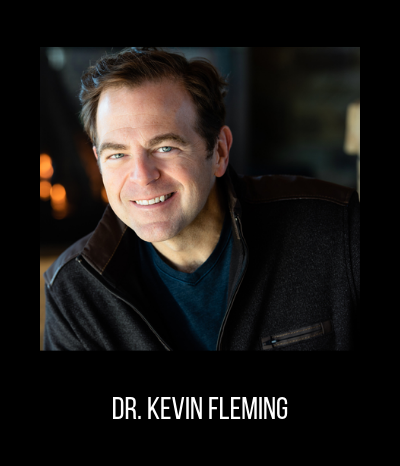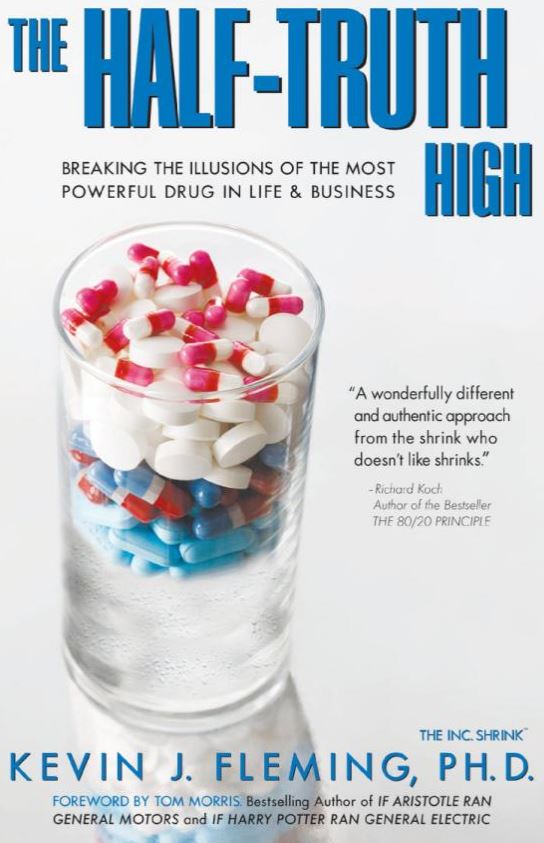Interview With Dr. Kevin Fleming
Dr. Kevin Fleming is Founder of a cutting edge neuroscience-infused executive/leadership development and behavior change consulting firm called Grey Matters International, Inc. (www.greymattersintl.com). Leveraging not just sharp-witted strategies to address irrationality, but also neurotechnology for radical shifts in decision making, Dr. Fleming achieves breakthroughs for his C-level clients that have far-reaching transformations from the Board room to their marriage/family life.
His thought leadership has been featured in Forbes, Fortune, New York Times and many top media outlets. He has been invited to speak to top leaders in the Middle East, as well as Cabinet Members for the King of Jordan, on neuroscience strategies for business transformation, and has received praise from faculty in both Harvard Medical and Business schools around his respected work.
To learn more about Dr. Fleming unique service and how true neuroscience can help bring about the changes you desire in your life, contact Grey Matters International today.
Q & A
What led you to pursue a professional interest in neuroscience-based coaching and behavioral change?
Great question. For years, I was a 'regular shrink' doing psychotherapy, counseling and anything talk therapy related. What I realized eventually through these years was something interesting: there was a feel-good collusion of sorts between the client and the therapist - and neither called the other on it, except in rare cases of a poor fit or where one's psychopathology prevented the actual engagement and skills needed to do the work itself. But when things were good, connectable, kind, helpful, useful, or any other "positive feedback" loop going on, we can get into a default network type mechanism or process between the "two brains" in dialogue. Said another way: what feels good, makes sense, and kind-of-sort-of helpful may not be what is essential for your being. And I felt shrinks weren't trained in making the bandwidth distinction between what is merely important and what is absolutely undeniably essential. Our training really predisposed us to make distinctions between pathology and a supposed 'normal' that wasn't actually really drilled down too well. But the ol' anchor effect (i.e. comparing an ill-defined 'norm' against extreme pathologies, the contrast effect helps one out in how they look to others and what they are doing) helped us look like rock stars in what we were doing :) And when a client in front of us is just so happy to get listened to and validated, we can inadvertently reinforce some Door #2 type solution that may 'feel' right or good, but may not be what we truly need at that moment.
Then coaches come on to the scene and they realize the hyper-pathology focus and they start selling into that "positive psychology" space appealing to those misguided by therapy. But again, we have another half-truth being sold by these folks, exploiting again a different anchor effect: that is, selling to the dissatisfaction piece the contrast can be appealing and influential, for at least the client knows that this is 'different' and not what they knew. Another illusion forms here, because what is different doesn't also mean what is essential for your most crucial shift. I have a saying in my work. I can either help someone or help them have the right problems. I am not about labeling, medicating and merely discussing DSM-IV terminologies; but I am also not about merely making people feel good through over-emphasized goal setting, motivational mantras that are all about 'tools' all the time. If we don't watch it, to the person with a hammer, the world becomes a nail.
Seeing the errors on both sides, Grey Matters International, Inc was formed. It was through a bunch of non-linear learning, my own mistakes with people to see where both approaches can fail people, and of course innovations with neurotechnologies that my model of my company really came to fruition. Meeting people where they were really at - not just in the cleaned up harder truth aspects of the philosophical tenets mentioned above, but also in a 'we come to you' travel model of work - it took off. As with all half-truths, they fade and their limitations come out into the light. Both the shrink world and the feel-good coaching world have shown their myopias. People I meet are seeking that hard-hitting truth, with the same level of sophistication a PhD training like mine affords me in conceptualization skills...to truly figure out what is going on. But with the advent of cognitive/affective neuroscience and behavioral economics, we can see some 'irrationalities' of human being-ness that is not just pathology or even some failed effort/motivation to perform and execute one's rational goals (which coaching over-emphasizes). This is the "sweet spot" grew to love working in. When life doesn't make sense...when success and happiness seem at odds...when pleasure-seeking becomes old...when we start admitting to our lies and self-deception within and how we can 'make people' think certain things about us that aren't true but we lack courage to 'get real'. These are the 'grey matters' of Grey Matters.
In reference to traditional therapy and counseling, you state that society has grown accustomed to accepting "minimal improvement." Why do think this is the case?
Well, part of it has to do with the intricate collusion of sorts noted above and the 'perfect storm' created between the intersectional issues between therapy and coaching that, quite frankly, are not readily discernible by clients seeking the best helper. Other reasons, in my opinion, have to do with the reliance on psychotropics and pharmacological interventions in general. These are symptom-based quick fix type solutions that we have conditioned ourselves to say we want (though deep down, when on these things for so long, we do realize the dissociative, disconnected 'fog' we get into and the resultant disempowerment it can be correlated to with someone's psyche). But the real culprit to the 'minimal improvement' love affair we have is a cultural phenomenon. So many marketing forces are putting needles in our veins that prevent us from waking up most fully. One day all this becomes the water we swim in, a sort of deadening of consciousness, all the while we ironically speak of hiring coaches to fulfill dreams, live passionately, etc. It is all so ironic. C.S Lewis had it figured out last century, he put this dilemma more inside the context of the spiritual dimension, though it parallels wonderfully:
As an expert in its application, could you briefly explain how neuroplasticity science is able to address psychological problems?
Neuroplasticity-based research that has grown considerably in the last 10-15 years really holds great promise for us in the behavior change business. Having said that, like all research-to-pop culture translations, we do inevitably lose a lot of the full truth behind what a brain can do and what it can't. But, yes, what we have now seen about the brain's ability to self-correct patterns, networks, signaltries, etc. all have huge implications on the psychological world. As one who exploits the latest of neuroplasticity research into his business, I have seen both depth and breadth changes that are noteworthy with human suffering that walks into my office - putting away my Frasier Crane persona and trading it out for some renegade neurotechnology has afforded me well. While one can never fully replace the gift of wisdom embodied in an insightful, loving human being guiding another, I have objectively seen breakthrough-like clarity in just 3-4 days of working with a wide array of psychological issues - from sleeping issues, to depression, to anxiety/panic, to trauma/PTSD, to brain injury, to cognitive and attentional issues. But don't trust me, tons of first person stories freely shared here: www.greymattersintl.com/company/testimonials/
Could you tell us about your book "The Half-Truth High: Breaking the Illusions of the Most Powerful Drug In Life & Business"?
This book was my first publication and honestly a work-in-progress as I now go back and re-read it :) But what it did was get out my heart onto some pages around where I felt some of the myths of thinking, assumptions, etc. around 3 core areas that most of us spend a lot of time in: self-help/psychology, biz world, or in religion. I realized the modern world was so hellbent on tools, solutions, measuring, managing, 'getting someone on board' so much so that we didn't care how pure our thinking was behind it or, even more potentially wrought with pitfalls, where the heart truly rested behind even the thinking. Like we now would define meta-cognition as 'thinking about our thinking", I guess you could say this inaugural book of mine was to slow folks down and get the seekers of humanity to not get deceived about all the over-emphasized outcome-loving stuff of this world of ours and admit that it may be better to save one's heart and lose out on a sale, a questionnaire or feedback rating of excellent, or be temporarily confused about a God construct if it meant it was for authentic reasons. This is hard for our Facebook-liking, bottom-line-loving world of ours to digest.
What would you say is the greatest barrier to "effective behavior change"?
Ah, a whopper of a question :) It really depends on what level you are speaking about, kind of like what we noted above in these questions. There are barriers on execution level, barriers on the thinking level, and barriers on the heart level (what we can call for this exercise something akin to the spirit of intention underneath our thinking, what we say, and what we do). But execution issues can be coached easiest, that is for sure. Thinking level stuff is hard but with proper didactics and enough time to ensure the proposed thinking shifts needed don't go through a 'sacred or taboo' value area, it can happen. But hearts? Ah, hearts don't change easily. Converting a heart is not something that happens through people like me. It is a God-thing, or for the agnostics of the world, something of Grace.
A brain tip you gave in a talk on the neuroscience of stress was to "assess your own narrative". What did you mean by this and why do you think it's such a helpful thing to do?
This recommendation was made in direct response to what I believe is a big problem with psychotherapy these days; namely, the inability or resistance (or both?) of most shrinks I know to get at the self-narrative being shared in therapy that becomes so much of the "DNA" of what a counselor uses as their "data" to make treatment decisions. The brain is wired to feel right, not necessarily seek automatically the fullest of truths. Self-deceptive machinery is alive and well in us all and we do have a strange love affair to be right even if doing so kills us in the end. Not sure we all assess the viability of the story we tell ourselves BEFORE we go into a therapy office. We walk in convinced, explicitly or implicitly, we know what is going on (even with all the pleasantries we speak about "just as I see it", 'my opinion', "and I may be wrong", etc.) and seek help from that starting place. For we aren't really interested in starting therapy with a reversal of our narrative. Which would go something like this: "Doc, I got a story about my pain that I want to see if it is really undeniably true. Even before we work on my resultant pain and symptoms I have. I want to explore many possible narratives first, filter them out...before we even start therapy. Game?"
You're renowned as a pioneering provider of cutting-edge mental health solutions for dignitaries and executive-level professionals worldwide. Why does success and high performance often have a negative impact on a person's psychological well-being?
Great question. Success and happiness confusions have to do with something called the hedonic treadmill, or hedonic adaptation. As people make more dough, there is a reciprocal increase as well in what they want, desire, expect, etc. This two way increase keeps things unsteady and not stable enough to assess concrete gains. Like moving on a treadmill, ground zero points keep changing. It all becomes relative now, not absolute. As it once was said, one learns via the success and the typical choices made (i.e. no one I know in the moment of increased wealth, dollar to dollar, gives away exponentially more IN THE SAME MOMENT OF TIME...no, they give away their millions later on usually once they are all set and comfortable and have excess) that one must walk more just to stay in place.
These are huge confusions on the brain for success operates on the same dopaminergic reward circuitry that most drugs do, hijacking it and the levels of contentment. As you see increased use with drugs, you see the same increase of decisions made, but this time with more socially acceptable justifications (attaining the American dream, using his drive, effort, motivation, etc). This makes the brain seek more rewards, and begins the switching of coconuts from joy to pleasure/satisfaction.
Connect With Dr. Kevin Fleming
Follow Dr. Fleming on LinkedIn
know someone who would be interested in this Q & A with Dr. Kevin Fleming? Share this page with them.
Go Back To The Psychology Expert Interviews Page
Go From Dr. Kevin Fleming's Q & A Back To The Home Page






New! Comments
Have your say about what you just read! Leave me a comment in the box below.